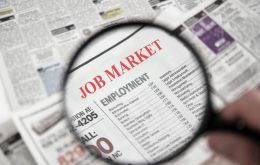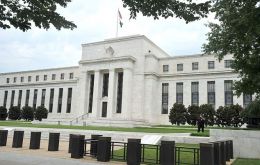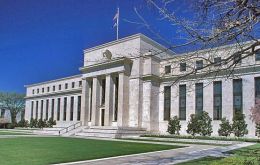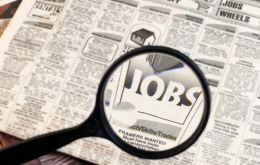MercoPress. South Atlantic News Agency
Tag: US jobless rate
-
Monday, September 4th 2017 - 10:40 UTC
US employment growth decreasing, but still strong; waiting for Harvey's aftermath

The US economy added 156,000 jobs in August, less than the previous month and below expectations. Analysts had expected US non-farm payrolls to rise by between 175,000 and 185,000 last month. Data released by the US Department of Labor also showed that employment growth in June and July was lower than originally estimated.
-
Saturday, October 3rd 2015 - 07:29 UTC
US jobs created in September sharply lower than expected; fears global slow-down is hitting America

The US economy added just 142,000 jobs in September, lowering the chance of an interest rate rise this year. The figure was far lower than the 205,000 increase forecast by economists. The number of jobs created in July and August were revised down by a combined 59,000.
-
Friday, July 24th 2015 - 11:02 UTC
US filings for unemployment benefits fall to its lowest since 1973

The number of US citizens filing new applications for unemployment benefits last week dropped to its lowest level in more than 41 and a half years (1973), suggesting the labor market maintained a sturdy pace of job growth in July.
-
Saturday, August 23rd 2014 - 06:18 UTC
Yellen insists with expansive policies despite growing pressure from 'hawks' on interest rate

Federal Reserve Chair Janet Yellen said Friday that the US jobs market has not yet fully recovered, but acknowledged that data is sending mixed signals, spurring debate over inflationary pressures. In a speech to leading central bankers in Jackson Hole, Wyoming, Yellen, who has kept Fed policy expansive due to perceived excess slack in the jobs market, gave no clear new signs for monetary policy.
-
Wednesday, July 16th 2014 - 01:06 UTC
US economy recovering but “too many Americans remain unemployed”

The US economic recovery remains incomplete, with a still-ailing job market and stagnant wages justifying loose monetary policy for the foreseeable future, Federal Reserve Chair Janet Yellen told a Senate committee on Tuesday.
-
Monday, April 1st 2013 - 09:17 UTC
US economy fourth quarter report positive, but still sluggish

The US economy grew at a faster than expected 0.4% in the fourth quarter of 2012, the Department of Commerce has said. The annualised figure was better than an earlier estimate of 0.1% growth, reflecting increased investments in plant and equipment.
-
Wednesday, September 14th 2011 - 06:40 UTC
A complete Spain lives below the poverty line in the US according to census

The United States poverty rate hit its highest level since 1993 in 2010 with a record 46 million Americans living below the poverty line, according to a US government report on Tuesday that depicted the grim effects of stubbornly high unemployment.
-
Saturday, April 2nd 2011 - 07:53 UTC
US jobless rate drop for second month running could indicate inflection point

US employment recorded a second straight month of solid gains in March and the jobless rate fell to a two-year low of 8.8%, (from 8.9% in February) marking a decisive shift in the labour market.
